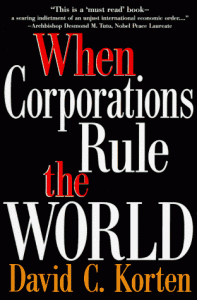When Corporations Rule the World
Chapter by Wayne Visser
Extract from The Top 50 Sustainability Books
Key Ideas
- We have been seduced by ‘corporate libertarianism’, which demands that all political, economic, and civic barriers to the free reign of corporate interests be removed.
- The result of this unhealthy power in corporate hands is ecological destruction, the loss of civil freedoms, the erosion of democracy and community disintegration.
- Although the current corporate globalization represents a failure of governments, it is more fundamentally a failure of the global capitalist economic system.
- Instead, we should be striving for ‘democratic pluralism’, which requires a “pragmatic, institutional balance between the forces of government, market, and civic society.”
- We are on the cusp of an Ecological Revolution, which puts people ahead of corporations, local communities ahead of global trade and nature ahead of money.
Synopsis
When Corporations Rule the World suggests that the promises of the global economy are based on a number of myths: that growth in GNP is a valid measure of human well-being and progress; that free unregulated markets efficiently allocate a society’s resources; that growth in trade benefits ordinary people; that economic globalization is inevitable; that global corporations are benevolent institutions that if freed from governmental interference will provide a clean environment for all and good jobs for the poor; and that absentee investors create local prosperity.
 Korten believes that these myths are finally being unmasked and challenged by an Ecological Revolution that calls us “to reclaim our political power and rediscover our spirituality to create societies that nurture our ability and desire to embrace the joyful experience of living to its fullest.” He argues that instead of concentrating on increasing economic growth and GDP, we should concentrate on ending poverty, improving our quality of life, and achieving a sustainable balance with the Earth.
Korten believes that these myths are finally being unmasked and challenged by an Ecological Revolution that calls us “to reclaim our political power and rediscover our spirituality to create societies that nurture our ability and desire to embrace the joyful experience of living to its fullest.” He argues that instead of concentrating on increasing economic growth and GDP, we should concentrate on ending poverty, improving our quality of life, and achieving a sustainable balance with the Earth.
In order to achieve this goal of “sustainable well-being for all people”, Korten believes that we need a multilevel system of nested economies with the household as the basic economic unit, up through successive geographical aggregations to localities, districts, nations, and regions. Each level would seek to function as an integrated, self-reliant, self-managing political, economic and ecological community.
A corporations of the future needs to show that it is “committed to investing in the future; providing employees with secure, well-paying jobs; paying a fair share of local taxes; paying into a fully funded retirement trust fund; managing environmental resources responsibly; and other wise managing for the long-term human interest. Such companies are a valuable community asset, and in a healthy economy, they pay their shareholders solid and reliable – but not extravagant – dividends over the long term.”
The Guiding Principles for an Ecological Revolution include environmental sustainability, economic justice, biological and cultural diversity, subsidiarity (where the economy serves human needs, not the needs of money, corporations or governments), intrinsic responsibility (internalising externalities), and common heritage (of the planet’s environmental resources and the accumulated human knowledge) …
Continue reading
[button size=”small” color=”blue” style=”download” new_window=”false” link=”http://www.waynevisser.com/wp-content/uploads/2012/04/book_top50_chap20_korten.pdf”]Pdf[/button] When Corporations Rule the World (chapter)
Related pages
[button size=”small” color=”blue” style=”info” new_window=”false” link=”http://www.waynevisser.com/books/the-top-50-sustainability-books”]Page[/button] The Top 50 Sustainability Books (book)
Cite this chapter
Visser, W. (2009) When Corporations Rule the World, In W. Visser & Cambridge Programme for Sustainability Leadership, The Top 50 Sustainability Books, Sheffield: Greenleaf.


